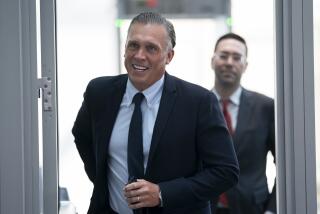U.S. May Cancel Enron Contracts
- Share via
WASHINGTON — The Bush administration said Friday that it may suspend or cancel up to $70million in government contracts awarded to energy giant Enron Corp. and its auditor, Andersen, if it determines that the companies no longer meet federal ethics standards.
The U.S. comptroller general also announced new restrictions on consulting work that accounting firms can do for the federal agencies they audit.
Meanwhile, Rep. Henry A. Waxman (D-Los Angeles) asked Vice President Dick Cheney to explain a section of the administration’s energy policy that Waxman said benefited Enron. The section promotes natural gas development in India, where Enron has an interest in a natural-gas-fueled power plant.
In a letter Friday, Mitchell E. Daniels Jr., director of the Office of Management and Budget, asked the General Services Administration to investigate allegations of “document shredding, manipulative accounting practices and other activities that could reflect poorly on these corporate entities and their ability to provide quality work.”
Federal agencies that contract work from Enron or Andersen, known until last year as Arthur Andersen, include the Pentagon, the Justice Department, Health and Human Services, Housing and Urban Development and the Treasury Department.
“These agencies should ensure that existing contracts with Arthur Andersen and Enron are being performed in accordance with contract terms and proper business practices,” Daniels wrote.
Federal rules require that companies doing business with the government have a satisfactory record of business ethics and integrity.
Enron filed for Chapter 11 bankruptcy protection Dec. 2, less than a month after the company reported that it had overstated earnings dating to 1997 by nearly $600million. Questions about its financial health and questionable accounting practices caused its stock price to plummet, wiping out the retirement savings of thousands of employees and costing investors billions of dollars.
Enron and Andersen each have about $35 million in government contracts, said OMB spokesman Trent Duffy. The government spends a total of about $200 billion each year on goods and services.
Andersen’s work includes auditing, accounting and management services for government entities including the Centers for Medicare and Medicaid Services and the State Department, according to the Federal Procurement Data System, which lists government contracts.
Enron’s work includes gas and electric services for the Air Force and the Justice Department’s prison system.
Tyson Slocum of Washington-based advocacy group Public Citizen called the review of Enron and Andersen contracts “prudent,” but he characterized the move as “damage control” by the White House, which has been attempting to distance itself from the Enron scandal. The beleaguered company’s former chairman, Kenneth L. Lay, was among Bush’s biggest supporters.
A White House spokeswoman said the decision to review the contracts was made entirely by the OMB.
Andersen spokesman Patrick Dorton said his company welcomed the review. “We have an excellent track record of government consulting,” he said.
Enron did not return phone calls Friday.
Waxman, meanwhile, asked Cheney to provide information on how the administration chose to recommend natural gas development in India.
Waxman and John D. Dingell (D-Mich.), the ranking Democrat on the House Energy and Commerce Committee, have been pressing Cheney for months to provide details of private meetings he and his energy task force held with outside interests while drafting the energy policy.
Cheney has said that he or his task force staff met six times with Enron representatives last year. But he has declined to provide additional details, saying it would hinder the free exchange of ideas.
Also Friday, Comptroller General David M. Walker, who has responsibility for setting the audit standards used by government entities, adopted rules designed to improve the independence of accounting firms that audit federal agencies.
Among other things, the rules ban firms from making management decisions or from selling agencies additional consulting services, such as bookkeeping, record keeping and, in some cases, payroll processing.
“We believe this is the right thing to do,” said Walker, a former Andersen partner who has recused himself from any issues related to his former employer. “There’s more interest now because of Enron, but this is something that has been in the works for three years and predates Enron.”
The rules will not apply to audits of corporations or publicly traded companies, but lawmakers are debating whether to mandate similar restrictions in the private sector.
In another development, congressional investigators demanded more information about Lay’s personal loans from the company.
“We are concerned about the unreported nature of these transactions and their effect upon Enron shareholders and employees, particularly during the stock’s steep decline in 2001,” Reps. W.J. “Billy” Tauzin (R-La.), chairman of the House Energy and Commerce Committee, and Dingell wrote in a letter to Lay.
In addition to the more than $200 million in compensation he received from Enron since 1999, Lay was provided with a revolving line of credit--$7.5 million last year. The collateral securing the line of credit apparently was Lay’s stock.
From February to October, Lay borrowed money and repaid it 15 times, according to investigators. In each case, he repaid it by returning stock to Enron. “He appears to have obtained some of those shares by exercising options, while in other cases he returned shares he already owned,” the letter sent by the lawmakers said.
The committee asked Lay for a detailed listing of all loan transactions involving himself, Jeffrey K. Skilling, Andrew Fastow, Michael Kopper, Rick Buy, Rick Causey, and any other senior Enron executive during 2001.
Investigators asked Lay to also explain the extent to which the Enron board was made aware of any loans or repayments.
Elsewhere, the White House defended a recommendation made in 1997 by longtime Bush political advisor Karl Rove that an Enron consulting contract be awarded to Ralph Reed, former executive director of the Christian Coalition and a prominent GOP strategist.
White House spokesman Ari Fleischer called Rove’s recommendation “fairly common and common-sensical.”
“Karl Rove gave Ralph Reed a good recommendation, as we all would, as we all do,” Fleischer said.
Slocum said the Bush campaign “was able to use Enron as a kind of campaign tool, where they were able to direct an extremely, extremely lucrative consulting position for a key ally that would become crucial in his primary battle.”
Reed, who advised Enron on how to generate grass-roots support for deregulation, said he did not ask Rove for a recommendation. He stopped working for Enron last year.
“I agreed to support George W. Bush for president because he was a friend, and I admired him a great deal and thought he would be a great president. Any suggestion that I supported him for any other reason is not only untrue but insulting.”
More to Read
Inside the business of entertainment
The Wide Shot brings you news, analysis and insights on everything from streaming wars to production — and what it all means for the future.
You may occasionally receive promotional content from the Los Angeles Times.











